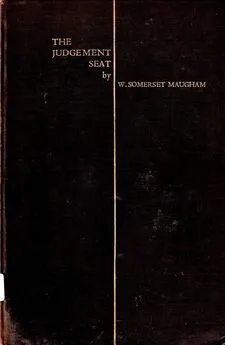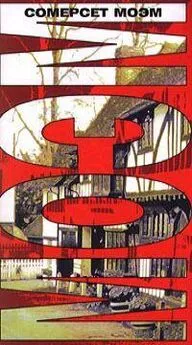Уильям Моэм - Английский язык с У. С. Моэмом. На окраине империи. Рассказы
- Название:Английский язык с У. С. Моэмом. На окраине империи. Рассказы
- Автор:
- Жанр:
- Издательство:неизвестно
- Год:неизвестен
- ISBN:нет данных
- Рейтинг:
- Избранное:Добавить в избранное
-
Отзывы:
-
Ваша оценка:
Уильям Моэм - Английский язык с У. С. Моэмом. На окраине империи. Рассказы краткое содержание
Метод чтения Ильи Франка
Английский язык с У. С. Моэмом. На окраине империи. Рассказы - читать онлайн бесплатно полную версию (весь текст целиком)
Интервал:
Закладка:
"I don't know (я не знаю). Perhaps never (возможно, никогда)."
"What in heaven's name do you mean (что, черт возьми: «во имя неба», ты хочешь этим сказать)?" cried Bateman (воскликнул Бейтман).
"I'm very happy here (я очень счастлив здесь). Wouldn't it be folly to make a change (не будет ли это глупостью — что-то менять)?"
wonder ['wAndq], lazily ['leIzIlI], change [tSeIndZ]
For a few minutes neither of them spoke. Bateman wondered how he should begin on the conversation which all the events of the day made him think more urgent.
"When are you coming back to Chicago?" he asked, suddenly.
For a moment Edward did not answer. Then he turned rather lazily to look at his friend and smiled.
"I don't know. Perhaps never."
"What in heaven's name do you mean?" cried Bateman.
"I'm very happy here. Wouldn't it be folly to make a change?"
"Man alive, you can't live here all your life (черт возьми, ты не можешь прожить здесь всю жизнь; alive — живой ). This is no life for a man (для человека это не жизнь). It's a living death (это какое-то жалкое существование: «это жизнь, подобная смерти»). Oh, Edward, come away at once, before it's too late (о, Эдвард, немедленно уезжай /отсюда/, пока не /слишком/ поздно). I've felt that something was wrong (я чувствовал, что что-то не так; wrong— неправильный; неподходящий, не тот, который нужен ). You're infatuated with the place (ты потерял голову из-за этого места; to infatuate— свести с ума; внушить сильную страсть ), you've succumbed to evil influences (ты поддался дурному влиянию; evil— злой; дурной, неблагоприятный;to succumb— поддаваться, уступать ), but it only requires a wrench (но /от тебя/ требуется только решительное действие; wrench— дерганье, рывок; резкая перемена умонастроения ), and when you're free from these surroundings (и когда ты освободишься /от влияния/ этого окружения) you'll thank all the gods there be (ты будешь благодарить всех богов). You'll be like a dope-fiend when he's broken from his drug (ты будешь похож на наркомана, которого оторвали от наркотика; dope— допинг; разг. наркотик, опиум;fiend— дьявол; демон; разг. раб привычки;to break— ломать; разрывать, прорывать;drug— лекарство; наркотик ). You'll see then that for two years you've been breathing poisoned air (тогда ты поймешь, что целых два года ты дышал отравленным воздухом). You can't imagine what a relief it will be (ты и представить себе не можешь того облегчения, которое испытаешь) when you fill your lungs once more with the fresh, pure air of your native country (когда вновь наполнишь свои легкие свежим, чистым воздухом родной страны)."
infatuated [In'fxtSueItId], succumb [sq'kAm], require [rI'kwaIq], wrench [rentS], dope-fiend ['dqupfi: nd]
"Man alive, you can't live here all your life. This is no life for a man. It's a living death. Oh, Edward, come away at once, before it's too late. I've felt that something was wrong. You're infatuated with the place, you've succumbed to evil influences, but it only requires a wrench, and when you're free from these surroundings you'll thank all the gods there be. You'll be like a dope-fiend when he's broken from his drug. You'll see then that for two years you've been breathing poisoned air. You can't imagine what a relief it will be when you fill your lungs once more with the fresh, pure air of your native country."
He spoke quickly (он говорил быстро), the words tumbling over one another in his excitement (захлебываясь словами от волнения; to tumble — упасть; идти спотыкаясь, появляться, вперемешку ), and there was in his voice sincere and affectionate emotion (в голосе его было искреннее и теплое чувство; affectionate — любящий; нежный ). Edward was touched (Эдвард был тронут).
"It is good of you to care so much, old friend (мило с твоей стороны так сильно заботиться обо мне, старина)."
"Come with me to-morrow, Edward (поехали со мной, завтра же, Эдвард). It was a mistake that you ever came to this place (было ошибкой, что ты вообще приехал сюда: «в это место»). This is no life for you (это неподходящая для тебя жизнь)."
"You talk of this sort of life and that (ты говоришь о том и этом образе жизни). How do you think a man gets the best out of life (а как, по-твоему, человек получает от жизни все самое лучшее)?"
"Why, I should have thought there could be no two answers to that (как, я думаю, что на этот /вопрос/ двух мнений быть не может; answer— ответ; решение /вопроса/, объяснение ). By doing his duty (выполняя свой долг), by hard work (напряженно работая: «напряженной работой»), by meeting all the obligations of his state and station (выполняя все обязательства /присущие/ его общественному положению и статусу; state— состояние; общественное положение;station— место; общественное положение )."
"And what is his reward (и какова же его награда)?"
"His reward is the consciousness of having achieved what he set out to do (его награда заключается в осознании того, что он достиг поставленных задач; to set— садиться, заходить /о небесных светилах/; ставить /задачи, цели и т. п./ )."
sincere [sIn'sIq], affectionate [q'fekS(q)nIt], obligation ["OblI'geIS(q)n], reward [rI'wO: d]
He spoke quickly, the words tumbling over one another in his excitement, and there was in his voice sincere and affectionate emotion. Edward was touched.
"It is good of you to care so much, old friend."
"Come with me to-morrow, Edward. It was a mistake that you ever came to this place. This is no life for you."
"You talk of this sort of life and that. How do you think a man gets the best out of life?"
"Why, I should have thought there could be no two answers to that. By doing his duty, by hard work, by meeting all the obligations of his state and station."
"And what is his reward?" "His reward is the consciousness of having achieved what he set out to do."
"It all sounds a little portentous to me (для меня это звучит немного напыщенно; to sound — звучать, издавать звук; звучать, создавать впечатление; portentous — зловещий; важный, напыщенный )," said Edward, and in the lightness of the night Bateman could see that he was smiling (сказал Эдвард, и при освещенности ночи = поскольку ночь была светлой Бейтман разглядел, что тот улыбается; lightness — освещенность, степень освещения ). "I'm afraid you'll think I've degenerated sadly (боюсь, тебе покажется, что я серьезно: «печально» дегенерировал/выродился = опустился). There are several things I think now (сейчас я мечтаю о таких вещах; to think— думать, размышлять; постоянно думать, мечтать ) which I daresay would have seemed outrageous to me three years ago (которые, полагаю, показались бы мне возмутительными три года назад)."
"Have you learnt them from Arnold Jackson (ты узнал о них от Арнольда Джексона)?" asked Bateman, scornfully (с насмешкой спросил Бейтман; scorn — презрение, пренебрежение; насмешка, высмеивание ).
"You don't like him (он тебе не понравился)? Perhaps you couldn't be expected to (пожалуй, этого и невозможно от тебя требовать; to expect— ожидать; рассчитывать, требовать ). I didn't when I first came (мне /он/ не понравился, когда я только приехал сюда). I had just the same prejudice as you (у меня было точно такое же предубеждение, как и у тебя). He's a very extraordinary man (он весьма необычный человек).
portentous [pO:'tentqs], degenerate [dI'dZenqreIt], outrageous [aut'reIdZqs], scornfully ['skO: nf(q)lI], prejudice ['predZqdIs], extraordinary [Ik'strO: d(q)n(q)rI]
"It all sounds a little portentous to me," said Edward, and in the lightness of the night Bateman could see that he was smiling. "I'm afraid you'll think I've degenerated sadly. There are several things I think now which I daresay would have seemed outrageous to me three years ago."
"Have you learnt them from Arnold Jackson?" asked Bateman, scornfully.
"You don't like him? Perhaps you couldn't be expected to. I didn't when I first came. I had just the same prejudice as you. He's a very extraordinary man.
You saw for yourself (ты сам видел) that he makes no secret of the fact that he was in a penitentiary (что он не делает тайны из того факта, что он был в тюрьме: «исправительном заведении»). I do not know that he regrets it or the crimes that led him there (я не знаю, сожалеет ли он об этом, или о тех преступлениях, что привели его туда). The only complaint he ever made in my hearing (единственная жалоба, которую он когда-либо высказал в моем присутствии; complaint— недовольство; жалоба;hearing— слух; предел слышимости ) was that when he came out his health was impaired (заключалась в том, что когда он вышел, его здоровье было подорвано; to impair— ослаблять; ухудшать, причинять ущерб ). I think he does not know what remorse is (мне кажется, он не знает что такое угрызения совести). He is completely unmoral (он совершенно безнравственен). He accepts everything and he accepts himself as well (он приемлет все, равно как и себя самого). He's generous and kind (он щедрый и добрый; generous — великодушный; щедрый )."
Читать дальшеИнтервал:
Закладка:

![Уильям Моэм - Сумка с книгами [Рассказы]](/books/1081361/uilyam-moem-sumka-s-knigami-rasskazy.webp)

